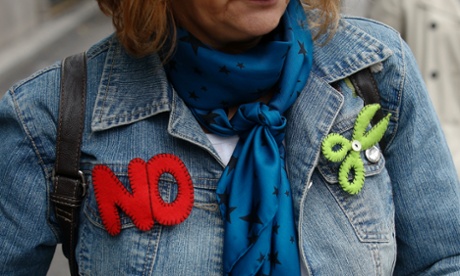Given the power of the Chamber, Wall Street banks, the insurance industry, the oil lobby and the drug companies, it is remarkable that Obama managed to enact the Affordable Care Act, the Dodd-Frank legislation, the Lilly Ledbetter Fair Pay Act and tough new standards on auto fuel efficiency and electric plant emissions. Voters rewarded Obama with a second term, defeated many business-backed candidates and ballot measures (like California’s anti-union Proposition 32), and voted in favor of living wages and same-sex marriage in several cities and states.
Despite these victories, the major contours of American politics remain intact. The nation’s extreme concentration of wealth still gives businesses and billionaires outsized political influence. Corporate campaign contributions and lobbyists tilt the political playing field so much that ordinary citizens often feel their votes and voices don’t count. When plutocrats dominate our politics, ordinary people feel powerless and paralyzed. The United States ranks number one in low voter turnout. Even in this year’s hotly contested elections, paradoxically (but understandably), the people least likely to vote — the poor, the jobless, the young — are those who need government the most, and who, if they did vote, would tend to favor liberals and Democrats.
However skilled Obama is as a politician — and despite the presence of many principled progressives and liberals in Congress — we cannot expect Congress to enact more than modest reforms until we tame the corporate plutocrats’ power. Ultimately, we need to change the system that ensnares even the most progressive politicians in its web.
Most Americans agree. Although Obama and Mitt Romney each received roughly half the popular votes on Tuesday, America is not an evenly divided nation. When it comes to public opinion on major issues, polls reveal that the majority of Americans actually have liberal or progressive views. That is, they think that big business (especially Wall Street) has too much political influence, money plays too big a role in our political system, and the very rich pay too little in taxes. They also believe that government should protect consumers, the environment and workers from corporate abuse, that Congress should raise the minimum wage so that full-time workers don’t live in poverty and that programs like Medicare, Medicaid, Social Security, unemployment insurance and food stamps are needed to protect people from economic hardship and insecurity.
In a healthy democracy, majority opinions should translate into public policy. But the voices of the majority of Americans often get drowned out by the influence of corporate America and billionaires. These are the (mostly) men who run the 100 largest Banks and Corporations, direct the nation’s major business lobby groups, sponsor the major conservative foundations and think tanks and even fund the Tea Party. They are not the richest one percent; they are the wealthiest tip of the one-hundredth of one percent. Numerically, they include no more than 10,000 people, although a much smaller number comprise what sociologists call the “inner circle” of the power elite. In this new Gilded Age of widening equality, they represent an American plutocracy.
It would be nice to believe that each American citizen has an equal voice in our political system — the consensus idea of “one person, one vote” — but the reality is very different. True, business power brokers like Lloyd Blankfein (CEO of Goldman Sachs), David Koch (the conservative billionaire who owns Koch Industries and who contributions millions to right-wing candidates and causes) and Michael Duke (Walmart’s CEO) each have only one vote. But their money — as individuals and as heads of major corporations — speaks louder than their votes.
For example, the six heirs of Walmart founder Sam Walton have nearly as much wealth ($90 billion) as the bottom 42 percent of Americans combined, and deploy their riches on behalf of a variety of conservative causes. In the last two decades, the Walton family
has spent nearly $5.1 million on federal elections, almost all of it to Republicans, while the Walmart Corporation PAC has spread millions in campaign cash to both Republicans and moderate Democrats.
How can we inject more democracy into our society?
We hope that in his second term, Obama will be bolder. He should diversify his White House inner circle of economic advisors and cabinet appointments to include more progressive voices, not just those who reflect business and banking. He should use his bully-pulpit to focus public attention on the outsized influence of the Chamber and other corporate lobby groups. He should be willing to deflect their attacks, as FDR did when he said “I welcome their hatred,” referring to the forces of “organized money.” As he did during his 2008 campaign, but stopped doing once he took office, Obama should encourage the organizers and activists who are challenging corporate power, recognizing that their ability to agitate and mobilize ordinary Americans can help him be a more effective president. LBJ understood this inside-outside dynamic, when he embraced the civil rights movement — adopting its “we shall overcome” motto in a 1965 speech to Congress — and took on the segregationists in his own party.
We’d like to see more of the Barack Obama who showed up on December. 6, 2011, at a high school in Osawatomie, Kansas, echoing the themes of the then-burgeoning Occupy Wall Street movement. There,
he said:
Just as there was in Teddy Roosevelt’s time there is a certain crowd in Washington who, for the last few decades, have said, let’s respond to this economic challenge with the same old tune. “The market will take care of everything,” they tell us. If we just cut more regulations and cut more taxes — especially for the wealthy — our economy will grow stronger… even if prosperity doesn’t trickle down, well, that’s the price of liberty. Now, it’s a simple theory… But here’s the problem: It doesn’t work. It has never worked.
We expect progressives in Congress — including newly-elected Senators Elizabeth Warren and Tammy Baldwin – not only to take leadership on key issues, but also to work closely with movements fighting for social, economic and environmental justice and sustainability.
But the responsibility for making change falls primarily on grassroots activists. After all the votes are counted, Republicans are likely to control the House by a 234 to 201 margin. Significant legislative reforms will require activists to persuade at least 17 Republicans to vote with the Democrats (while keeping every Democrat in the fold). Unions, community organizers, enviros, women’s groups and other activists should target the increased number of House Republicans who narrowly squeaked to victory on November 6 in “swing” districts and could be vulnerable to defeat in two years. These groups should mobilize voters and public opinion to insist that these Republicans (as well as moderate Democrats in “swing” districts, too) side with ordinary people, not Wall Street, the oil industry, and the Chamber of Commerce. If their campaign war chests were filled with corporate cash, activists should force them to answer: Which side are you on?
In other words, during Obama’s second term, activists need to be bolder and more audacious, like the women’s suffragists, before them. A central task for progressive leaders, organizations and activists during the next four years (and beyond) is to expose the agenda and power grab of billionaires and corporate plutocrats. Only visible and consistent action will create political space — and pressure — for Obama and Congress to act on behalf of the majority of Americans.
We saw this strategy work in Obama’s first term. For example, in 2009 and early 2010, Obama’s health care reform proposal looked dead-on-arrival until
activists began organizing protests at insurance company headquarters and at the homes of industry CEOs, drawing attention to their outrageous profits and compensation, and giving voice to the victims of the industry’s abusive practices, such as denying insurance coverage to people with illnesses. The protests catalyzed media coverage, strengthened Obama’s resolve, and pushed some moderate Democrats to reluctantly vote for reform.
During Obama’s second term, activists, immigration and education reformers and community organizing activists needs to keep the heat on big business, using protest, civil disobedience, lawsuits, boycotts and other strategies to keep these issues in the public mind and keep the heat on Congress to enact needed changes on such pressing issues as raising the minimum wage, the epidemic of foreclosures and “underwater” home prices, student debt, fair taxation, the fiscal crises of cities and states, immigration reform and the nation’s inadequate response to global warming. Each of these issues has broad majority support, policy solutions and burgeoning grassroots movements behind them.
But the efforts of issue-oriented movements would be much, much easier if we could change the system that puts so many hurdles in the way of making our country a healthier democracy.
Specifically, we need three kinds of structural “mobilizing” reforms that will dramatically level the political playing field, weaken the power of the corporate plutocracy and strengthen the voices of ordinary Americans.
1. Campaign finance reform that levels the playing field between billionaire money and ordinary people.
Candidates for president and Congress this year
raised more than $6 billion in campaign contributions. Ultimately, America must eliminate the corrosive impact of money in politics. But until a more liberal Supreme Court reverses course on several conservative rulings that consider corporate money a form of “free speech” (such as
Buckley v. Valeo and
Citizen’s United), we need stepping stone reforms that start leveling the playing field.
Legislation now pending before Congress, the Fair Elections Now Act, would provide public funding to House and Senate candidates who get their support from large numbers of small donors instead of wealthy contributors, bundlers or lobbyists. The bill’s lead sponsors in the House are Rep. John Larson (D-CT), Walter Jones (R-NC), and Chellie Pingree (D-ME) and in the Senate is Majority Whip Dick Durbin (D-IL).
A number of states have passed “clean elections” laws that reduce the influence of private campaign cash in favor of public funding, but courts have ruled several of them out of existence. In New York, reform activists and Gov. Andrew Cuomo are backing a public financing bill modeled after a successful law in New York City.
2. Voting reform to make it easy to register and to vote .
Senator Kirsten Gillibrand (D-NY) and Congressman John Lewis (D-GA) are sponsoring the Voter Empowerment Act that would make voter registration easy and simple, and thus increase voter turnout. It would make Election Day Registration the law of the land as currently exists in Idaho, Iowa, Maine, Minnesota, Montana, New Hampshire, Rhode Island, Wisconsin and Wyoming.
According to Demos, a nonprofit, non-partisan think tank, voter turnout in these states has historically exceeded turnout in other states by 10 to 12 percentage points.
We should also mobilize to make it easier to vote by turning Election Day into a national holiday and require accessible early voting in every state. No one should have wait in line for several hours to cast their vote.
3. Labor law reform that gives workers the real freedom to join unions so there are grassroots organizations that can challenge corporate power.
Throughout the last century and even today, unions have been the most effective vehicle to successfully challenge corporate power. The labor movement has been a significant engine of social and economic reform, responsible for Social Security, the minimum wage, the 8-hour-day, unemployment insurance, workplace safety laws and funding for public K-12 and higher education.
Today, however, only 11.8 percent of the workforce is
unionized, despite the fact that more than half of all non-management employees tell pollsters they would like a union in their workplaces. The reason for this huge disparity is that
employers routinely violate the law by firing and demoting workers who demonstrate their support for union organizing drives. Employers get away with this because penalties are too small to deter these abusive practices.
We need to update our Labor Laws to give workers a real voice on the job by setting real, deterrent-sized penalties and fines and enforceable remedies for employers who violate workers’ rights to organize.
As the great abolitionist Frederick Douglas noted, without protest there is no progress. We need to focus on immediate issues that improve people’s lives, but we also need to build support for system-changing reforms that will give ordinary Americans a stronger voice in our democracy.







